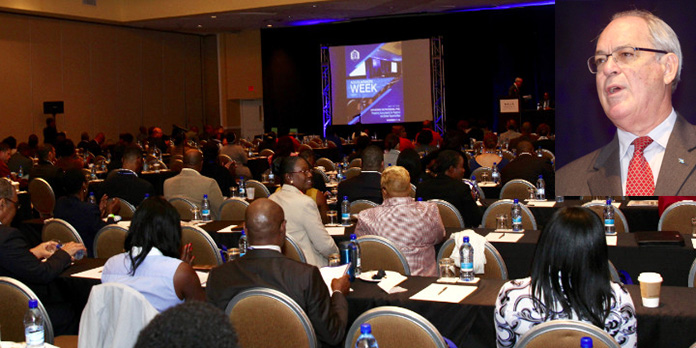
NASSAU, The Bahamas – In a bid to counteract the effects of the current economic crisis and to stimulate economic recovery in The Bahamas, the government is ‘aggressively’ pursuing ways to boost the economy. This, according to the Minister of Financial Services, Trade & Industry and Immigration, the Hon. Brent Symonette is an objective that is of top priority to the government. Minister was speaking to stakeholders during the Bahamas Institute of Chartered Accountants (BICA) ‘Accountants Week’ Opening Ceremony. The event was held at Melia Nassau Beach, November 14, 2017.
“Our plan is to reinforce the principles of strong leadership, based on ethical governance, that is transparent and accountable, and which applies firm and prudent fiscal responsibility and management,” said Minister Symonette. “These elements are vital to the financial stability and future growth of the Bahamian economy.”
He said that the country’s fiscal deficit is estimated to be 5.7 percent of Gross Domestic Product (GDP) for the fiscal year ending June 2017, up from 3.5 percent of GDP in FY2016, due to sharp increases in the wage bill, post-hurricane cleanup and reconstruction spending, temporary tax reliefs, and disruptions in revenue collection.
The central government debt-to-GDP ratio, he explained, is estimated to have increased to 73 percent of GDP in FY2017.
“This was incurred in the previous five years under the former administration,” he said. “What this means is that we are in pretty bad shape! And it will take tough decisions to steadily reduce the annual deficit and decrease government debt.”
He said that these dramatic actions would have long lasting implications for all investors and citizens.
“In order for The Bahamas economy to compete and prosper in [the] global environment, we must create conditions that facilitate the “ease of doing business” in an open, innovative, productive and competitive environment.
“The Bahamas ranks 121st place among 190 countries on the World Bank’s ease of doing business index,” said Minister Symonette. “The government has embraced this idea, with the understanding that we must be forward thinking if we are to advance ourselves as a nation, and continue to compete in the global economy.
The IMF October 2017 reported that The Bahamas has had a prolonged period of stagnation, resulting in declining income relative to neighboring countries; concerns about fiscal sustainability; and a severe household debt overhang problem.”
He pointed out that they also cited elevated public debt, limited external buffers, and a pegged exchange rate regime, as constraints to the policy space to allow response to shocks.
“For its part, the government is committed to creating favorable conditions by building an efficient public sector and investing in public infrastructure to sustain, support and spur economic growth,” he said. “Currently in progress is the drafting and tabling of legislation to streamline procedures and improve the ease of doing business.”
As well as, the enhancement and reconfiguration of government agencies to facilitate ease of process and sharing of information between agencies (companies registrar, business license unit, NIB, BIA, regulatory agencies), the Minister said that the government has already begun to implement changes to immigration processes for tax residency, work permit relaxation for certain classes of persons, economic permanent residency and threshold for purchase of a residence to $750,000.







